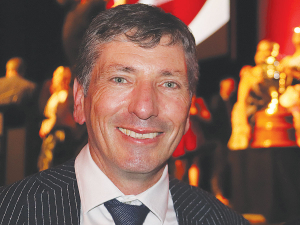Cleland named OSPRI chair
Southland farmer and director Tony Cleland has been named OSPRI New Zealand’s new chair.
 Sam McIvor says one of the challenges posed by the logistics problems is having product in market for special occasions – such as cultural festivals.
Sam McIvor says one of the challenges posed by the logistics problems is having product in market for special occasions – such as cultural festivals.
Beef+Lamb NZ chief executive Sam McIvor says the word he's getting from the meat exporters is that one of their most time consuming tasks is logistics.
He says they are using every tool in the box to deal with the issue and it is a major focus of their respective businesses.
One of the challenges, posed by the logistics problems, is having product in market for special occasions - such as cultural festivals. The Chinese New Yeas, Christmas and Easter are some of the larger ones. McIvor says getting the supply chain issues right is critical.
"But I think, to be fair, globally everyone is getting a little more tolerant of the fact that if a product doesn't turn up tomorrow, so be it," he told Rural News. "But there is also the risk that if people don't have the product when they want it, they will switch to an alternative and may not come back to the original one. So yes, there are risks about our ability to supply customers and what that might mean over time."
McIvor notes that NZ's meat industry is still in the middle of its busiest time of the year for processing stock. And with some areas hit by drought, farmers are having to talk to their processing companies as soon as they can to book space.
"But unlike last year, when about 70% of the country was in drought, it's not that bad this year - which does provide some options," he says.
"For example, farmers on the west coast of the North Island are saying they have had their best season ever. So, I think there are probably options other than slaughter."
McIvor says farmers are are getting better at managing climate change by investing in better stock classes and making early decisions. He says productivity in the sheep and beef sector has increased massively resulting in the same number of lambs being produced from fewer capital stock.
"During the dry period we don't have the same pressure now on our farm systems."
McIvor believes that farmers are also taking a much more holistic approach to their farming operations. Taking on board the needs and views of customers, who are focusing on products that take into account climate and envrionmental issues.
He notes the emphasis has ramped on such things as essential fresh water and biodiversity, and farmers in turn want to do the right thing and incorporate these requirements into their business plans.
New Zealand's new Special Agricultural Trade Envoy, Horowhenua dairy farmer, company director and former Minister of Agriculture, Nathan Guy says the Free Trade Agreement (FTA) with India is a good deal for the country.
New figures show dairy farmers are not only holding on to their international workforce, but are also supporting those staff to step into higher-skilled roles on farm.
New tractor deliveries for 2025 jumped 10% compared to the previous year, a reflection of the positive primary sector outlook, according to the Tractor and Machinery Association (TAMA).
Entries have opened for two awards in the New Zealand Dairy Industry Awards (NZDIA) programme, aimed at helping young farmers progress to farm ownership.
Federated Farmers has confirmed interim chief executive Mike Siermans to the role.
Registrations are now open for the 2026 Ruralco Golf Classic, with all proceeds from the event set to support the Mid Canterbury Rural Support Trust.

OPINION: If the hand-wringing, cravat and bow-tie wearing commentariat of a left-leaning persuasion had any influence on global markets, we'd…
OPINION: With Winston Peters playing politics with the PM's Indian FTA, all eyes will be on Labour who have the…